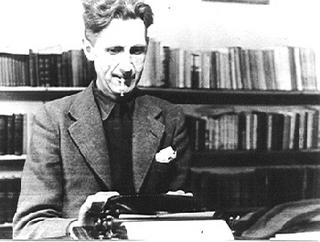
When I was at high school, we had to write essays saying how living in 1984 was totally unlike living in ''1984'.
The joke is that 2005 is more like '1984' than 1984 ever was. Talk about 'Back to the Future'
...And The Shotgun Sings The Song
The so-called 'shoot-to-kill' part of the proposed 'anti-terror' bill is proving to be a sticking point for the Premiers.
Here's another entry from the Margo Kingston Web Diary .
It's written by somebody who is more used to writing academic essays on law practices but it does bear investigating. It kicks off with this little bit here:
Judicial oversight in relation to anti-terrorism laws largely means the supervision by judges of the exercise of powers by police and security organisations. Such supervision is aimed at two purposes. First, it ensures that police and security organisations act within the limits set by the law. In doing so, judicial oversight ensures the rule of law. More than this, given that statutory law is the expression of democratically elected parliaments, judicial oversight also advances representative democracy. Secondly, judicial oversight may help to prevent police and security organisations from resorting too easily to their anti-terrorism powers. Many of these powers, like the proposed control and preventive detention orders, are unprecedented and hence, should be exercised only in the most extreme of circumstances. The prospect of having to justify the use of these powers to independent authority may mean that police and security organisations use their powers more sparingly.In other words, shoot-to-kill powers is a real problem for the law courts because it would presumably mean a judge is going to have to wear bad decisions that he/she wasn't party to when the police officer fires 5 rounds into the back of an innocent Brazilian's head, apropos to the fact. That would worry me too.
While the role of judicial oversight is significant, it is crucial to note that it is also limited. Such oversight is largely directed at ensuring that the law is upheld. For instance, if the laws are drafted so as to allow detention without trial, judicial oversight, however effective, will not prevent such detention (subject to constitutional limitations). Effective judicial oversight, however, can ensure that such detention is carried out within statutory and constitutional limitations and used as a last resort.
It is also important to note that mere involvement of a judicial officer in the exercise of powers by police and security organisations does not give rise to effective judicial oversight. Other conditions must be present for such oversight. First, the judicial officer must be sufficiently senior, for instance, a member of the Federal Court or a State Supreme Court. S/he should not be a member of the Federal, State or Territory Magistracy. This ensures an appropriate degree of expertise and independence.
Further, effective judicial oversight requires that the judicial officers be involved prior to the grant of the powers. This is especially the case with the proposed preventive detention and control orders.[4] This is practically possible even in urgent situations. Courts can be convened by telephone and using electronic communications in emergency sittings, if required, provided that appropriate systems are put into place by working with Court Registries.

Merry Christmas Mr. Orwell
Meanwhile, Prime Minister John Howard is sayinig he expects the Anti-terror laws to go through by Christmas. Great.
But he has refused to speculate on whether the laws, which would allow people suspected of knowing someone involved in terrorism to be detained for 14 days without charge, would lead to the immediate arrest of 80 Australians known to have trained with terrorist organisations overseas.We're writing laws so we can put away about 80 people on a kind of assumption that they're possibly going to turn terrorist. Well, to paraphrase a Czech I once knew, "There are not such thing as 'terrorists', only 'potential-troublemakers'".
"There's been an extraordinary amount of speculation about numbers of people, the identities of them, it is all speculation," Mr Howard told reporters.
"The law is yet to be passed by parliament - I hope it will be passed by parliament before Christmas. It would be in the national interest if it were.
"I have every reason to believe that (the powers) will be used appropriately, but it is not for me to speculate on numbers or timings or anything of that kind, it depends entirely on how the laws operate."
It also gets better:
Senator Brandis denied using the term.Well, it seems we can call John Howard anything we like right up until Christmas. After that we're all terrorists up for questioning. Welcome to the dystopia born of despondency.
But Mr Trad said it could land him in jail under the proposed laws.
"It's not just this house arrest issue," Mr Trad told the Seven Network.
"I mean, they're talking about provisions for disaffection, for criticising the prime minister, for criticising the government.
"I recall last year that Senator Brandis described the prime minister as a lying rodent. Under this legislation, he could be placed in prison for seven years."
Just why aren't we fighting in the streets yet?

No comments:
Post a Comment